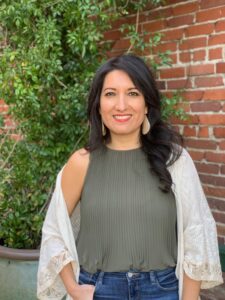Latinx Heritage Month II: Our Messiah was a Migrant
Scripture — Matthew 1:17 (NRSV)
So all the generations from Abraham to David are fourteen generations; and from David to the deportations to Babylon, fourteen generations; and from the deportation to Babylon to the Messiah, fourteen generations.
Focus
Our Messiah was a migrant and so were his people. He was shaped by the rituals of remembrance that recalled those deportations and the pain and trials that accompanied them. He was shaped by hearing about those ancestors who stood steadfast in the face of fear and violent dictators. He was shaped by the hesed love of God to a people time and time again. Grief and grace shaped our Messiah. If you want to see God on the move, see the people that are on the move. The migration stories of his ancestors and his very own birth story were a means of God’s grace.
Devotion
My friend Dr. Robert Chao Romero taught me that “migration is a means of grace”. God crossed heavenly and earthly borders and migrated into our skin to be clothed by us and be with us. The gospel writer in Matthew also tells us an interesting fact in verse 17: “there are fourteen generations from David to the deportations to Babylon, and from the deportation to Babylon to the Messiah, fourteen generations.” Jesus’ genealogy is a whole sermon for me, as I shared about yesterday. Jesus is situated well within a larger story of a group of migrant people.
Jesus belonged to a people rooted in place. Jesus today cares about how people belong and are rooted in place.
Jesus belonged to a people that got displaced. Jesus today cares about how people belong and then are forcefully displaced.
Jesus belonged to a people that endured trauma as they were deported into exile. Jesus today cares about how people are healing from trauma at a time when we have the most refugees we have ever had in global history.
Jesus probably heard the stories of migration from his mother, father, and other community leaders. Jesus cares to know the stories of migration from those around us, as his people themselves were migrants.
Our Messiah was a migrant and so were his people. He was shaped by the rituals of remembrance that recalled those deportations and the pain and trials that accompanied them. He was shaped by hearing about those ancestors who stood steadfast in the face of fear and violent dictators. He was shaped by the hesed love of God to a people time and time again. Grief and grace shaped our Messiah. If you want to see God on the move, see the people that are on the move. The migration stories of his ancestors and his very own birth story were a means of God’s grace.
Reflect
Think of a time that you had to move (homes, vocation, ideologies, countries, or states). What were the highs and lows of that season?
Act
Consider the migration stories in our current news cycle. Consider how this is a modern representation of our ancestral exilic stories. Act in mercy as the Spirit leads you.
Pray
Oh migrant God, thank you for sending your son Jesus to migrate from heaven to earth to be clothed by us and be with us and feel like us. Oh God of the migrant people of Israel who often were displaced and oppressed, help us to see current migrant stories in need of our mercy and intervention. Remind us that when we show up in mercy, you show up in mercy. Messiah Jesus, you yourself were a refugee and a migrant; grant us eyes to see you in the eyes of every child, woman, and human in crisis areas. Oh God, save us. Amén.
Banner image by Julie Ricard on Unsplash.
Find all Life for Leaders devotions here. Explore what the Bible has to say about work at the High Calling archive, hosted by the unique website of our partners, the Theology of Work Project. Reflection on today’s Life for Leaders theme can be found here: The Family of Judah.
Subscribe to Life for Leaders
Sign up to receive a Life for Leaders devotional each day in your inbox. It’s free to subscribe and you can unsubscribe at any time.

Inés Velásquez-McBryde
Chaplain at Fuller Theological Seminary & Pastor, Preacher, Speaker
Inés Velásquez-McBryde is a pastor, preacher, reconciler and mujerista theologian. She is the lead pastor and co-founder of The Church We Hope For. She is originally from Nicaragua, a third generation pastor, and the first pastora in her family. Inés earned her MDiv at Fuller Theolo...


